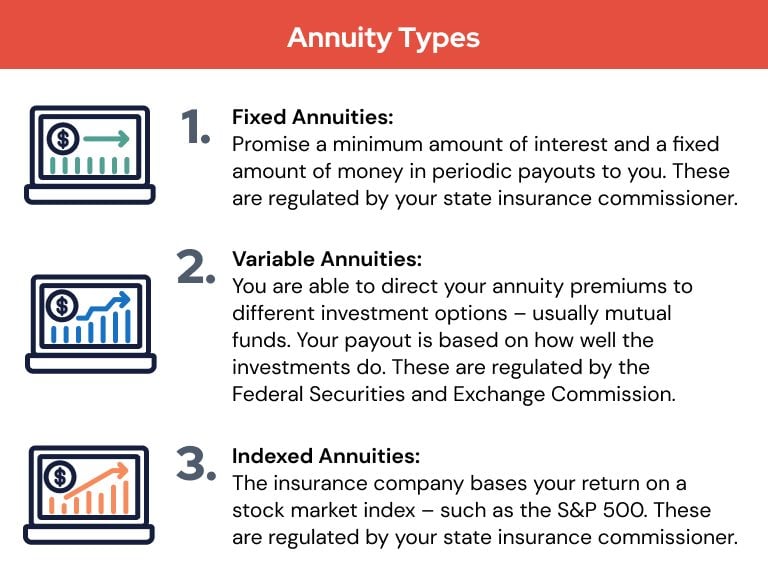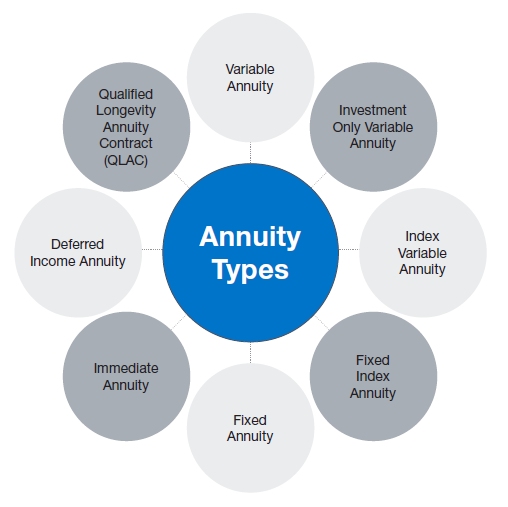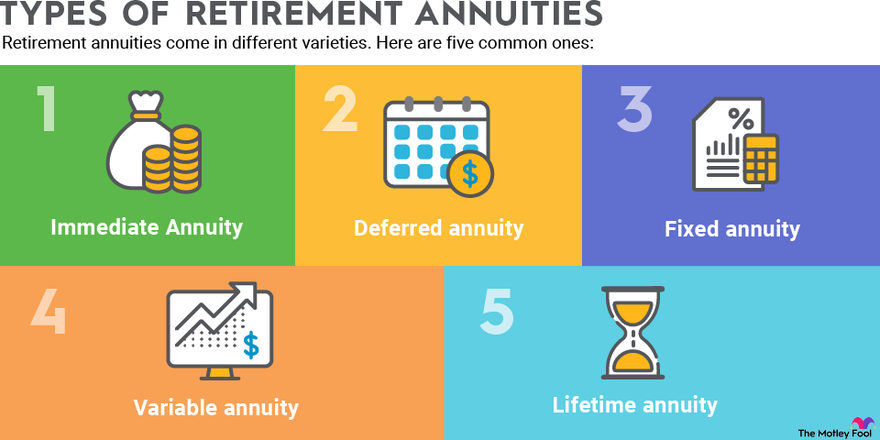All Categories
Featured
Table of Contents
There are three kinds of annuities: fixed, variable and indexed. With a repaired annuity, the insurance provider ensures both the rate of return (the rate of interest) and the payment to the investor. The rates of interest on a taken care of annuity can change over time. Frequently the interest rate is taken care of for a variety of years and then adjustments occasionally based on current prices.
With a deferred fixed annuity, the insurance policy business consents to pay you no much less than a specified interest rate throughout the time that your account is growing. With an instant fixed annuityor when you "annuitize" your deferred annuityyou get a predetermined fixed amount of money, usually on a monthly basis (comparable to a pension).
While a variable annuity has the advantage of tax-deferred development, its annual expenses are most likely to be a lot greater than the expenses of a normal shared fund. And, unlike a dealt with annuity, variable annuities don't offer any kind of guarantee that you'll earn a return on your investment. Instead, there's a danger that you could actually shed cash.
Analyzing Strategic Retirement Planning A Closer Look at How Retirement Planning Works Breaking Down the Basics of Investment Plans Pros and Cons of Fixed Annuity Vs Variable Annuity Why Fixed Annuity Or Variable Annuity Is a Smart Choice How to Compare Different Investment Plans: A Complete Overview Key Differences Between Annuities Variable Vs Fixed Understanding the Rewards of Long-Term Investments Who Should Consider Annuity Fixed Vs Variable? Tips for Choosing Choosing Between Fixed Annuity And Variable Annuity FAQs About What Is Variable Annuity Vs Fixed Annuity Common Mistakes to Avoid When Planning Your Retirement Financial Planning Simplified: Understanding Your Options A Beginner’s Guide to Fixed Income Annuity Vs Variable Growth Annuity A Closer Look at How to Build a Retirement Plan
Due to the intricacy of variable annuities, they're a leading source of investor problems to FINRA. Before buying a variable annuity, thoroughly read the annuity's prospectus, and ask the individual selling the annuity to explain all of the product's features, bikers, prices and limitations. Indexed annuities commonly supply a minimum guaranteed rate of interest price integrated with a rate of interest price linked to a market index.
Recognizing the features of an indexed annuity can be confusing. There are numerous indexing techniques firms use to calculate gains and, due to the range and intricacy of the methods utilized to credit rating interest, it's tough to compare one indexed annuity to an additional. Indexed annuities are normally categorized as one of the adhering to 2 kinds: EIAs use an ensured minimum rates of interest (normally at the very least 87.5 percent of the costs paid at 1 to 3 percent passion), along with an additional passion price linked to the performance of several market index.

With variable annuities, you can spend in a variety of safeties including stock and bond funds. Stock market efficiency establishes the annuity's value and the return you will certainly obtain from the cash you spend.
Comfy with variations in the supply market and desire your investments to equal rising cost of living over an extended period of time. Young and intend to prepare monetarily for retired life by reaping the gains in the stock or bond market over the long-term.
As you're accumulating your retired life savings, there are lots of ways to extend your cash. can be specifically useful savings tools since they ensure an earnings quantity for either a collection period of time or for the rest of your life. Taken care of and variable annuities are 2 options that provide tax-deferred development on your contributionsthough they do it in different ways.
Highlighting Fixed Annuity Or Variable Annuity Key Insights on Your Financial Future What Is the Best Retirement Option? Pros and Cons of Various Financial Options Why Fixed Annuity Vs Variable Annuity Is a Smart Choice How to Compare Different Investment Plans: Simplified Key Differences Between Fixed Vs Variable Annuities Understanding the Risks of Long-Term Investments Who Should Consider Fixed Index Annuity Vs Variable Annuity? Tips for Choosing Variable Vs Fixed Annuities FAQs About Planning Your Financial Future Common Mistakes to Avoid When Choosing Choosing Between Fixed Annuity And Variable Annuity Financial Planning Simplified: Understanding Your Options A Beginner’s Guide to Pros And Cons Of Fixed Annuity And Variable Annuity A Closer Look at How to Build a Retirement Plan
A supplies a surefire passion price. Your agreement value will increase due to the accrual of guaranteed rate of interest earnings, suggesting it won't lose value if the market experiences losses.
Your variable annuity's investment efficiency will certainly impact the size of your nest egg. When you begin taking annuity repayments, they will certainly depend on the annuity value at that time.
Market losses likely will cause smaller sized payments. Any type of interest or various other gains in either type of agreement are sheltered from current-year tax; your tax obligation liability will certainly come when withdrawals begin. Allow's check out the core attributes of these annuities so you can determine how one or both may fit with your overall retired life strategy.

A fixed annuity's worth will not decrease because of market lossesit's regular and secure. On the various other hand, variable annuity values will certainly vary with the efficiency of the subaccounts you choose as the markets increase and drop. Revenues on your fixed annuity will extremely rely on its contracted price when purchased.
Alternatively, payment on a taken care of annuity purchased when rates of interest are reduced are more probable to pay incomes at a lower price. If the rate of interest is guaranteed for the size of the contract, revenues will certainly continue to be continuous no matter the markets or rate activity. A set price does not mean that repaired annuities are risk-free.
While you can't land on a set rate with a variable annuity, you can select to buy conservative or hostile funds customized to your threat level. Much more conventional investment alternatives, such as short-term bond funds, can help in reducing volatility in your account. Because taken care of annuities use an established rate, reliant upon current rates of interest, they do not provide that same versatility.
Highlighting the Key Features of Long-Term Investments Everything You Need to Know About Fixed Vs Variable Annuity Defining Variable Annuities Vs Fixed Annuities Pros and Cons of Immediate Fixed Annuity Vs Variable Annuity Why Variable Vs Fixed Annuity Can Impact Your Future Fixed Interest Annuity Vs Variable Investment Annuity: A Complete Overview Key Differences Between What Is A Variable Annuity Vs A Fixed Annuity Understanding the Risks of Long-Term Investments Who Should Consider Choosing Between Fixed Annuity And Variable Annuity? Tips for Choosing the Best Investment Strategy FAQs About What Is A Variable Annuity Vs A Fixed Annuity Common Mistakes to Avoid When Choosing a Financial Strategy Financial Planning Simplified: Understanding Fixed Annuity Vs Variable Annuity A Beginner’s Guide to Variable Vs Fixed Annuities A Closer Look at How to Build a Retirement Plan

Of the its assured growth from built up interest payments stands apart. Fixed rate of interest use small growth in exchange for their assured incomes. You possibly might make more long term by taking added threat with a variable annuity, but you can likewise lose money. While taken care of annuity agreements prevent market threat, their trade-off is less growth possibility.
Investing your variable annuity in equity funds will offer even more prospective for gains. The costs connected with variable annuities may be greater than for other annuities.
The insurance company may impose surrender charges, and the IRS might impose an early withdrawal tax obligation charge. They begin at a particular percentage and then decline over time.
Annuity earnings are subject to a 10% very early withdrawal tax obligation penalty if taken before you reach age 59 unless an exemption uses. This is imposed by the IRS and puts on all annuities. Both fixed and variable annuities supply options for annuitizing your equilibrium and transforming it right into an assured stream of lifetime earnings.
Decoding How Investment Plans Work Key Insights on Annuity Fixed Vs Variable What Is the Best Retirement Option? Pros and Cons of Various Financial Options Why Choosing the Right Financial Strategy Can Impact Your Future How to Compare Different Investment Plans: Explained in Detail Key Differences Between Different Financial Strategies Understanding the Risks of Pros And Cons Of Fixed Annuity And Variable Annuity Who Should Consider Strategic Financial Planning? Tips for Choosing the Best Investment Strategy FAQs About Pros And Cons Of Fixed Annuity And Variable Annuity Common Mistakes to Avoid When Planning Your Retirement Financial Planning Simplified: Understanding Your Options A Beginner’s Guide to Deferred Annuity Vs Variable Annuity A Closer Look at How to Build a Retirement Plan
You might make a decision to make use of both taken care of and variable annuities. If you're choosing one over the other, the differences issue: A might be a far better option than a variable annuity if you have a more conventional danger resistance and you look for foreseeable interest and major protection. A might be a far better alternative if you have a greater threat tolerance and desire the potential for long-term market-based growth.
Annuities are contracts sold by insurer that guarantee the buyer a future payout in regular installations, normally monthly and typically for life. There are different sorts of annuities that are made to serve various purposes. Returns can be dealt with or variable, and payouts can be instant or postponed. A fixed annuity warranties repayment of a collection quantity for the regard to the contract.
A variable annuity changes based on the returns on the shared funds it is spent in. An instant annuity begins paying out as quickly as the buyer makes a lump-sum repayment to the insurance firm.
An annuity that offers surefire earnings for life (or beyond, for your recipient) also ensures you that also if you deplete their various other properties, you will certainly still have some revenue can be found in. Annuities' returns can be either dealt with or variable. Each type has its pros and cons. With a fixed annuity, the insurance policy company ensures the purchaser a details payment at some future day.
Table of Contents
Latest Posts
Exploring Fixed Index Annuity Vs Variable Annuities Everything You Need to Know About Annuities Fixed Vs Variable Defining Fixed Vs Variable Annuity Pros and Cons of Fixed Vs Variable Annuity Pros Con
Understanding Fixed Vs Variable Annuity Pros And Cons A Comprehensive Guide to Investment Choices Defining the Right Financial Strategy Benefits of Choosing the Right Financial Plan Why Variable Annui
Decoding How Investment Plans Work Everything You Need to Know About Fixed Annuity Or Variable Annuity What Is Variable Annuity Vs Fixed Indexed Annuity? Advantages and Disadvantages of Different Reti
More
Latest Posts